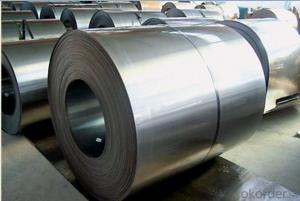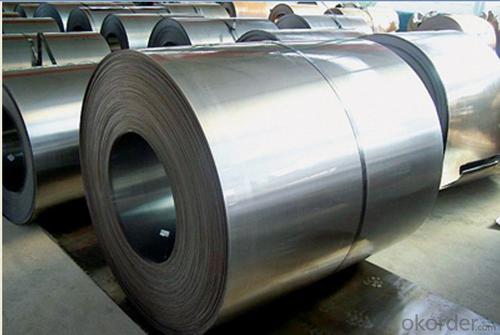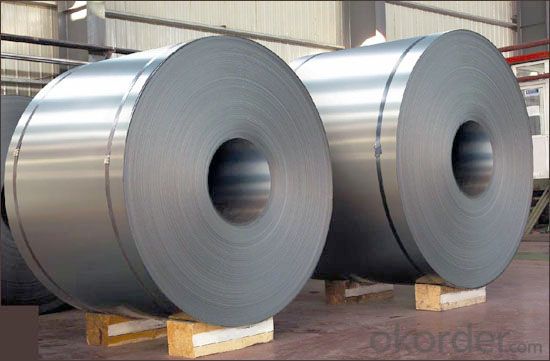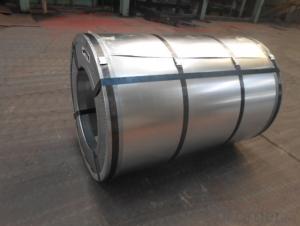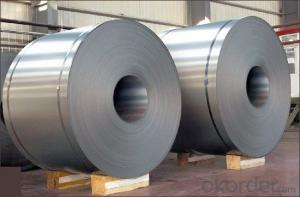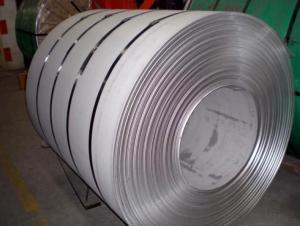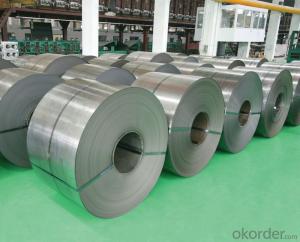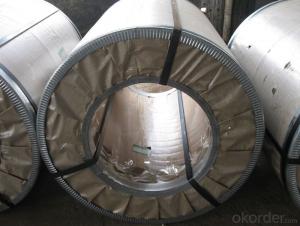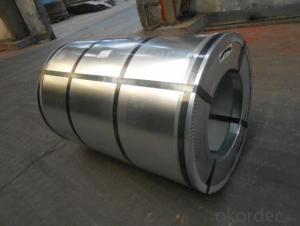BEST COLD ROLLED STEEL COIL WITH HIGH QUALITY AND COMPETITVE PRICE NO.1
- Loading Port:
- Tianjin
- Payment Terms:
- TT OR LC
- Min Order Qty:
- 25 m.t.
- Supply Capability:
- 5000 m.t./month
OKorder Service Pledge
OKorder Financial Service
You Might Also Like
Cold rolling means that hot rolled steel coil is rolled below recrystallization temperature after pickling, and its finished product is full hard coil. After annealing process for full hard coil, the finished product is cold rolled production. The thin gauge cold rolled steel sheet and strip steel have advantages of low surface roughness, high dimension accuracy and good mechanical properties etc, and which have been widely used in auto manufacturing, home appliance, architecture, aviation, precision instrument, hardware and enameling industry etc.
Main specification:
COLD ROLLED STEEL | |
Thicknenss | 0.10mm-4.00mm |
Width | 600mm-2000mm |
Sheets length | 1200-6000mm |
Coil inner diameter | 508-610mm |
Surface treatement | matt finish/bright finish,oiling/dry, bright anneal/black anneal |
Coil weight | 3-5t |
We can supply customers' with different specifications of the highest quality and lowest price.
Cold rolled steel is the based material for galvanized steel coil and pre-painted galvanized steel coil. It is widely used in light industry for marking tank, furniture, refrigerators, washers, freezer plate, air conditioner, micro-wave oven, water heater, soot such machine etc.
With excellent cold bending molded manufacturablity, good decoration effect, strong anti-corrosion ability, galvanized steel coils and sheets are also pollution-free and easily recycled. Accordingly, they can be used as final products and basic plates of color coated steel coils.
Sincerely welcome to contact us for the future details if any item interest you ,and we will make every effort to assure that your requirements will be satisfied ,and we hope to establish long-term business relations with you on the basis of the equality and mutual benefit.
We are waiting for your feedback.
- Q: what do you think about it? Is it a good steel for the money? the knife that i have with that steel is the kershaw chill. good knife for the price
- 8Cr13MoV is a decent blade steel...not a great steel, but about as good as you will generally find without paying much higher prices. It's used by a number of well known knife makers... It's basically equivalent to AUS-8 and will work and hold an edge reasonably well for most basic cutting chores. *************************************** From Wikipedia, the free encyclopedia: 8Cr13MoV, a Chinese stainless steel tempered at the Rc56 to Rc58 range and used in the Tenacious, Persistence, Ambitious, Resilience, Grasshopper, Kiwi3 and Byrd lines of knives. Often compared to AUS-8, but with slightly more Carbon.
- Q: How are steel coils used in the production of automotive wheels?
- Steel coils are used in the production of automotive wheels as they are shaped and molded into rims before being welded or bolted onto the wheel hubs. The steel coils provide the necessary strength and durability required for the wheels to handle the weight and stresses of the vehicle, ensuring a safe and reliable driving experience.
- Q: If needed for Defence could a stainless steel sword kill someone my buddy wanted this sword for Defece after it is sharpend here is a picture
- Ya it could kill someone if it was sharpened enough but from experience stainless steel swords don't get as sharp as Carbon or higher grade steel. Not to mention it would probably bend if you hit someone with it all the way. Hell the one I let some people who were chopping a bush ( just a normal bush ) they were playing around and it got bent. I'm going to say I can't suggest a stainless steel sword for anything other then handing on your wall. Not even going into the whole If you use a sword for self defense is it considered self defense? debate. It's a sketchy situation not to mention you would need training with a sword to actually use it without it just getting brushed off.
- Q: Which one has more electrical resistivity? Wood or steel? And why?I know that the resistivity depends on the material of the conductor, but i want a perfect explaination please.Thnx in advance :)
- Steel Resistivity
- Q: What are the different types of steel alloys used in coil production?
- There are several types of steel alloys used in coil production, including carbon steel, stainless steel, and high-strength low-alloy (HSLA) steel. These alloys offer varying levels of strength, corrosion resistance, and formability, making them suitable for different applications in industries such as automotive, construction, and manufacturing.
- Q: What are the different types of steel coatings for coils?
- Coils can be coated with various types of steel coatings, each with its own unique properties and advantages. Some of the most commonly used coatings include: 1. Galvanized Coating: This type of steel coating is widely utilized for coils. It involves applying a layer of zinc to the steel, which provides excellent protection against rust and corrosion. It is particularly suitable for outdoor applications or environments with high moisture levels. 2. Galvannealed Coating: Galvannealed steel coating involves subjecting the galvanized steel to additional heat treatment, resulting in a matte finish and improved adhesion for paint. It offers enhanced corrosion resistance and is often preferred in the automotive and construction sectors. 3. Aluminized Coating: Coating steel coils with aluminum provides outstanding heat resistance and corrosion protection. Aluminized steel is commonly employed in exhaust systems and other applications involving high temperatures. 4. Organic Coatings: Steel coils can also be coated with organic materials like paints or powder coatings. These coatings offer additional protection against corrosion and can be customized to meet specific aesthetic requirements, available in a wide range of colors. 5. Tin Coating: Tin-plated steel coils are covered with a layer of tin, which provides excellent solderability and resistance to corrosion. This type of coating is frequently used in the production of cans and other food packaging materials. 6. Phosphate Coating: Phosphate coatings are often applied as a pre-treatment before other coatings to enhance adhesion and corrosion resistance. They create a thin, crystalline layer on the steel surface, facilitating better adhesion of paint or powder coatings. These examples illustrate the diversity of steel coatings available for coils. The choice of coating depends on specific application requirements, considering factors such as corrosion resistance, heat resistance, paint adhesion, and aesthetic preferences.
- Q: How are steel coils stored in warehouses?
- Steel coils are typically stored in warehouses by placing them on sturdy racks or shelves, often in a vertical position. This allows for efficient use of space and easy access to the coils for transportation or further processing. Additionally, steel coils are usually separated by wooden or metal spacers to prevent damage from contact with each other.
- Q: How are steel coils used in the production of agricultural machinery parts?
- Steel coils are used in the production of agricultural machinery parts as they provide a durable and strong material for manufacturing components such as plow blades, tiller tines, and harvesting machine components. The steel coils are typically cut, shaped, and welded to create the necessary parts that can withstand the harsh conditions and heavy-duty operations involved in agricultural activities.
- Q: How do steel coils contribute to energy performance in buildings?
- Steel coils contribute to energy performance in buildings primarily through their use in HVAC systems. Steel coils are commonly used in heating, ventilation, and air conditioning (HVAC) systems as heat exchangers or condenser coils. These coils help in transferring heat between the indoor and outdoor environments, allowing for effective heating or cooling of the building. The high thermal conductivity of steel enables efficient heat transfer, optimizing energy usage and enhancing the overall energy performance of the building. By facilitating appropriate temperature control and reducing energy consumption, steel coils play a vital role in improving the energy efficiency of buildings.
- Q: What are the different methods of roll forming steel coils?
- There are several different methods of roll forming steel coils, each with its own unique characteristics and applications. Some of the most common methods include: 1. Traditional Roll Forming: This is the most widely used method and involves passing a continuous strip of steel through a series of rollers to gradually shape it into the desired profile. This method provides high precision and repeatability, making it suitable for producing complex shapes and profiles. 2. Pre-Punch and Cut: In this method, the steel strip is pre-punched with holes or slots before it is roll formed. This allows for easier cutting and shaping of the material during the forming process. Pre-punching and cutting can improve efficiency and reduce waste in certain applications. 3. Post-Punch and Cut: This method is similar to pre-punching and cutting, but the holes or slots are added after the roll forming process. This allows for more flexibility in creating custom shapes and designs, as the holes can be placed precisely where needed. 4. Post-Forming: In some cases, the steel strip may be first roll formed into a basic shape or profile and then further manipulated or formed after the initial roll forming process. This method allows for additional customization and can be used to create more complex geometries. 5. Progressive Roll Forming: This method involves passing the steel strip through a series of rollers in a continuous process, with each roller gradually adding a specific feature or forming a particular part of the final profile. Progressive roll forming is commonly used for long, continuous profiles with repetitive shapes. 6. Incremental Roll Forming: In this method, the steel strip is incrementally formed by a series of small movements of the rollers. This allows for greater flexibility in shaping complex profiles and can be particularly useful for producing prototypes or low-volume production runs. Overall, the choice of roll forming method depends on the specific requirements of the application, such as the desired shape, complexity, precision, and production volume. Each method offers its own advantages and limitations, and manufacturers often select the most appropriate method based on these factors.
Send your message to us
BEST COLD ROLLED STEEL COIL WITH HIGH QUALITY AND COMPETITVE PRICE NO.1
- Loading Port:
- Tianjin
- Payment Terms:
- TT OR LC
- Min Order Qty:
- 25 m.t.
- Supply Capability:
- 5000 m.t./month
OKorder Service Pledge
OKorder Financial Service
Similar products
Hot products
Hot Searches
Related keywords
